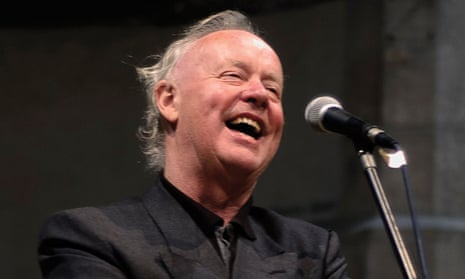The poet Brendan Kennelly, who has died aged 85, invited readers to embrace and understand their polar opposites. His most ambitious and controversial work, Cromwell (1983), addressed the archetypal enemy of his native Ireland – Oliver Cromwell as commander of the English campaign there in 1649-50 – empathetically.
The Book of Judas (1991), a 400-page work that was a bestseller in Ireland, suggested that the classic traitor had loved, and indeed created, the man whom he betrayed with a kiss.
This insistence on acknowledging “the Other” marked a reaction to “the obscenity of labelling people” and the need for the “violation of inherited prejudices”. Kennelly insisted that “Irish people must become English imaginatively, Protestants become Catholics and men become women”.
In selecting five poems to render into Greek, the translator Vera Konidari told me that she settled on ones that formed “a sort of confession of a man who tries to come to terms with conflicts, his language, the past which merges with the present. It represents a spiritual journey.”
With regard to his most anthologised poem, My Dark Fathers, Kennelly himself told me: “Poetry is written by blind men groping for the light” – here, evoking the silencing of spontaneous artistic expression by the famine that followed the failure of the Irish potato crop in the 1840s:
Upon the headland, the encroaching sea
Left sand that hardened after tides of Spring,
No dancing feet disturbed its symmetry
And those who loved good music ceased to sing.
His sense of quest and confession was particularly vivid for those who heard his public readings. Kennelly was both a sensualist, revelling in the erotic, exotic and extravagant in the natural world, and also acted as a social conscience: for many Irish people in an era of radical social transformation, he symbolised the transition from rural to urban life. He could relish the city of Dublin, but always in the light of the enduring qualities of village life, imprinted during childhood and adolescence.
Born in Ballylongford, near Listowel, Co Kerry, Brendan was the son of Bridie (nee Ahern), a nurse, and Timmie Kennelly, a publican. The inspiration and perspective of the hamlet in south-west Ireland remained a world of intensities, as brought out in My Dark Fathers.
Kennelly was educated locally before winning a scholarship to Trinity College Dublin. After some hesitation – working as a clerk in the Electricity Supply Board and as a bus conductor in London – he gained a degree in English and French from TCD (1961), and studied with Derry (Norman) Jeffares at Leeds University, where he took a PhD with a thesis on modern Irish poets and the Irish epic. He started working as a lecturer at TCD in 1963.
As professor of modern literature (1973-2005) at TCD he won the affection of students – among them long-term prisoners in Irish jails – for his wide-ranging and uninhibited approach to the subject. A Kennelly lecture was an occasion, an idiosyncratic performance of deeply felt humanity, humour and compassion.
His work as a critic, including his masterly essay on WB Yeats, An Experiment in Living, appeared in the collection Journey Into Joy (1994). He held visiting professorships in the US and the Netherlands, and served three terms as chairman of Ireland’s Cultural Relations Committee, promoting the country’s culture abroad. To mark his 85th birthday earlier this year, TCD launched the Brendan Kennelly Literary Archive.
In 1969 he married Peggy O’Brien, who had come to Dublin as a student from Massachusetts, and they had a daughter, Doodle (Kristen). The breakdown of the marriage and his subsequent treatment for alcoholism led him into translations of Federico García Lorca’s Blood Wedding (1996) and of classic texts, Medea, Antigone and The Trojan Women, published as When Then Is Now (2006).
In these Kennelly gave full voice to the rage of women betrayed, belittled and degraded, who not merely assert the strengths of their womanhood but state their otherness to the prevailing male orthodoxy. Woman became for him the centre of both beauty and anger. Yet Kennelly never overcame his own fear of women, which he attributed to the Catholic upbringing that insisted that woman was “an occasion of sin”.
In writing as in sport – he was a good footballer – Kennelly displayed grace under pressure. Heart bypass surgery in 1996 left him physically frail and increasingly withdrawn. Yet emotionally and imaginatively he continued thirsting for the ecstatic: “I’d like to become a poem,” he told me, “to become coherent and accomplished and singing.” One of his most effective – his signature of affirmation and celebration – is Begin:
Though we live in a world that dreams of ending
that always seems about to give in
something that will not acknowledge conclusion
insists that we forever begin.
His marriage ended in divorce in 1987, and Doodle died in April this year. He is survived by three brothers, two sisters and three grandchildren.

Comments (…)
Sign in or create your Guardian account to join the discussion